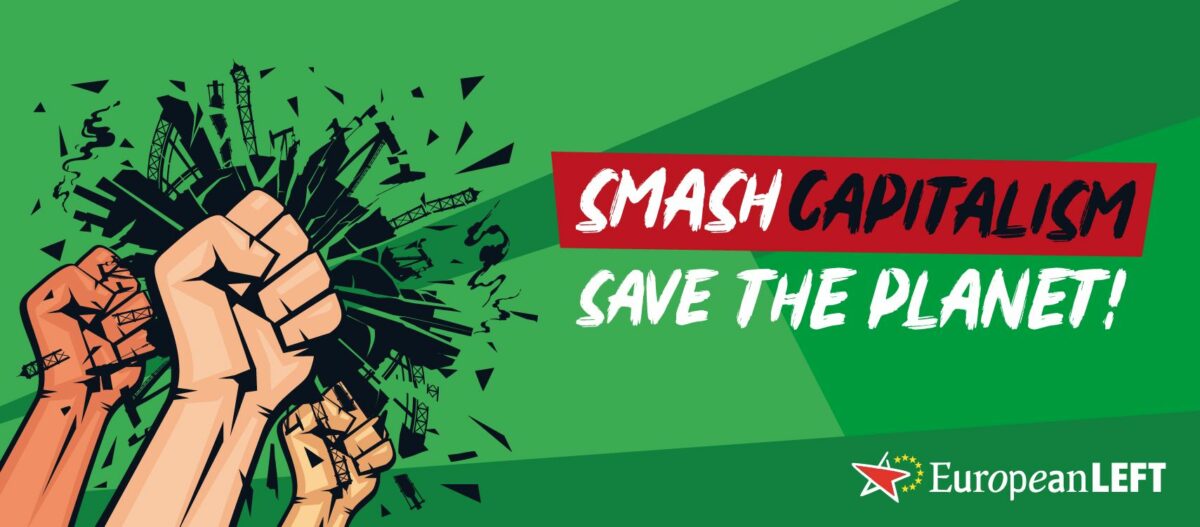Euroopan vasemmistopuolue perustettiin Brysselissä vuonna 2004. Puolueen ensimmäinen toimisto pystytettiin brysseliläiseen yksityisasuntoon, jonka jälkeen EV on kasvanut runsaasti jäsenpuolueidensa ja toimintansa puolesta. EV:n ensimmäinen kongressi järjestettiin Ateenassa vuonna 2005. Suomesta SKP on Euroopan vasemmiston ainoa jäsenpuolue, vasemmistoliitto on tarkkailijajäsenenä ja Kommunistinuoret vaikuttaa ELYNissä, joka on Euroopan vasemmiston nuorten verkosto.
Viimeisin Euroopan vasemmiston kongressi pidettiin joulukuussa 2022. Silloin EV:n puheenjohtajaksi valittiin Walter Baier Itävallan kommunistisesta puolueesta. EV:n hallituksessa SKP:stä ovat Liisa Taskinen ja Tiina Sandberg.
Seuraava sitaatti EV:n manifestista (hyväksytty 2004) kuvaa hyvin puolueen periaatteita:
”Toimintamme nojaa sosialismin, kommunismin ja työväenliikkeen arvoihin ja perinteisiin, jossa ajetaan feminismiä, sukupuolten välistä tasa-arvoa, ympäristöliikehdintää ja kestävää kehitystä, rauhaa, kansainvälistä solidaarisuutta, ihmisoikeuksia, humanismia, antifasismia, edistyksellistä ja liberaalia ajattelua. Toimintamme on kansallista ja kansainvälistä.”
EV:n kongresseja järjestetään kolmen vuoden välein, joissa valitaan puheenjohtajisto ja päätetään asiakirjoista. SKP on viime vuosina ajanut onnistuneesti muun muassa työajan lyhentämisen kirjaamista EV:n poliittisiin tavoitteisiin sekä vihreän imperialismin paljastamista ja proletaarisen ympäristöliikkeen rakentamista.
Euroopan vasemmisto on järjestänyt yhteistyössä aktivistien ja muiden yhteiskunnallisten toimijoiden kanssa vuodesta 2017 lähtien joka vuosi Eurooppalainen foorumin (European Forum), joka toimii eurooppalaisten vasemmistotoimijoiden ja muiden edistyksellisten maailmaa muuttavien kansalaisjärjestöjen kanssa.
Laajaa vasemmistolaista yhteistoimintaa
EV ei ole varsinaisesti puolue, vaan enemmänkin löyhä liittouma tai joustava verkosto. EV koostuu jäsen-, tarkkailija- ja kumppanipuolueista, joita on yhteensä 42. Osa puolueista kannattaa ja osa vastustaa EU-jäsenyyttä – suhtautuminen EU-jäsenyyteen onkin kenties suurin unionia koskeva linjaero EV:n jäsenpuolueiden välillä. Tästä huolimatta kysymys ei ole keskinäistä yhteistyötä estävä tekijä, sillä puolueilla on yhteisiä poliittisia päämääriä kapitalismin kaatamiseksi työväenluokan ja planeetan hyväksi. SKP vaatii irtautumista uusliberalistisesta Euroopan unionista ja yhteisvaluutta eurosta sekä sen sijaan työväen ja kansojen välisen punaisen yhteistyön rakentamista.
EU-eroa vaativat Euroopan vasemmiston jäsenpuolueet, kuten SKP, näkevät, ettei unionin demokratisointi onnistu sisältä käsin, sillä EU:n perussopimuksilla pyritään estämään kansanvaltaisuuteen ja julkisen sektorin voimistamiseen tähtäävän politiikan teko jäsenmaissa. Silti SKP:n ja Kommunistinuorten mielestä EU-vaaleihin kannattaa osallistua, sillä kaikki vaalit ovat tärkeitä puhujalavan paikkoja ja parlamenttiin läpipääsevät kommunistit voivat toimia työväenluokkaisen EU-kriittisen rintaman vahvistamiseksi.
Europarlamentaarikot, jotka edustavat Euroopan vasemmiston jäsenpuolueita, toimivat GUE/NGL-parlamenttiryhmässä. EV saa myös rahoitusta GUE/NGL:n kautta. Kaikki GUE/NGL:n jäsenpuolueet eivät kuitenkaan välttämättä kuulu Euroopan vasemmistoon.
Työryhmät, verkostot ja transform! europe
EV:ssä on eri työryhmiä ja verkostoja, jotka koordinoivat eurooppalaista vasemmistolaista yhteistyötä eri politiikan sektoreiden osalta:
• Latinalaisen Amerikan ja Karibian työryhmä (Latin America & Caribbean)
• Pohjois-Amerikka-työryhmä (Northern America)
• Afrikka-työryhmä (Africa)
• Lähi-itä-työryhmä (Middle East)
• Ympäristötyöryhmä (Environment)
• Rauhantyöryhmä (Peace)
• Feminismityöryhmä (Feminism)
• LGBTIQ+-työryhmä
• Julkisten palvelujen työryhmä (Public Services)
• Talouspolitiikan työryhmä (Economic Policies)
• Äärioikeiston vastainen työryhmä (Fighting the Far Right)
• Viestintätyöryhmä (Communication)
• Maataloustyöryhmä (Agriculture)
• Koulutustyöryhmä (Education)
• Maahanmuuttotyöryhmä (Migration)
• Asumisverkosto (Housing Network)
• Kulttuuriverkosto (Culture Network)
• Nuorten verkosto (ELYN – European Left Youth Network)
Lisäksi EV:n ay-aktiivit toimivat TUNEssa (Trade Unionist Network Europe), joka kokoaa ammattiyhdistysliikkeen voimia yhteistyöhön ja pitää yhteyksiä vasemmistolaisiin puolueisiin Euroopassa.
Euroopan vasemmiston nuoret ELYN (European Left Youth Network) on paitsi oma verkostonsa, niin myös linkki eurooppalaisten nuorten ja muiden yhteistyötahojen ajatusten vaihtoon. ELYN julkaisee kannanottoja ja järjestää tapahtumia esimerkiksi Eurooppalaisen foorumin yhteydessä. Eräällä tapaa ELYNiä voisi kuvailla myös Euroopan vasemmiston nuorisojärjestöksi, jolloin Euroopan vasemmistopuolue on emopuolue.
transform! europe -verkosto on ajatushautomo, joka julkaisee analyyttisiä tekstejä eurooppalaisesta vasemmistolaisuudesta ottaen kantaa myös kansainvälisemminkin. transform! europe toimii Euroopan vasemmiston kanssa tiiviissä yhteistyössä. EV:llä ja transform! europella on yhteistä toimintaa; esimerkiksi kesäyliopistot ja pääasiassa nuoremmille suunnatut keskusteluareenat, joita on järjestetty eri Euroopan maissa.
Euroopan vasemmisto on mukana kokoamassa vuosittain järjestettävää Eurooppalaista foorumia (European Forum), jossa käydään vasemmistolaista, edistyksellistä, ekologista ja feminististä keskustelua aikamme haasteista, vaihtoehtojen voimistamisesta sekä ulospääsyjen löytämisestä kriiseihin. Foorumissa on tekijöinä ja osallistujina EV:n voimien lisäksi muun muassa eurooppalaisia, paikallisia ja kansainvälisiä joukkoliikkeitä sekä kansalaisyhteiskuntaa.
Peace, bread and roses
YouTuben, muun viestinnän ja kannanottojen perusteella Euroopan vasemmisto on selkeästi militantimpi kuin GUE/NGL, jonka viestintä ei ole niin radikaalia – päinvastoin, meininki on hyvin kesyä. “For the many, not the few” on linjaus, jossa ei suuremmin vaadita. EV:n kongressia 2019 varten sovitettu Bella Ciao -kappaleen uusi flamenco-versio soi näkyvästi EV:n YouTubessa ja somessa näkyy viestintää tapahtumista ja monenlaisista paikallisista ja yhteiseurooppalaisista kamppailuista sekä hienoja visuaalisia kuvia Málagan kongressin kuvista taistelevine taustakuvineen. Euroopan vasemmiston kanavat kannattaakin ottaa seurantaan Instagramissa, Facebookissa, Twitterissä ja YouTubessa.
Yleinen linja Euroopan vasemmistossa siis on, että yhteistyötä voidaan tehdä kaikkien vasemmistolaisten tahojen kanssa. Luonnollisista ajoittaisista erimielisyyksistä huolimatta vuoropuhelu ja yhtenäinen henki Euroopan vasemmistossa on varsin hyvällä tasolla.
Linkkejä ja lähteitä
https://www.european-left.org/who-we-are/
https://www.european-left.org/who-we-are/history/
https://www.european-left.org/our-parties/
https://www.european-left.org/wp-content/uploads/2018/11/Manifesto-European-Left_ENG.pdf
https://www.youtube.com/channel/UCl_YWFMr23gqf2ljq4Eh7XQ
https://www.youtube.com/channel/UCd0B4xk88w6cDX9aItXAfPQ
https://www.guengl.eu/history/
“The European Left – Its Current State and Prospects”
– Heinz Bierbaum
(transform! europe, 2019; s. 182-193)

